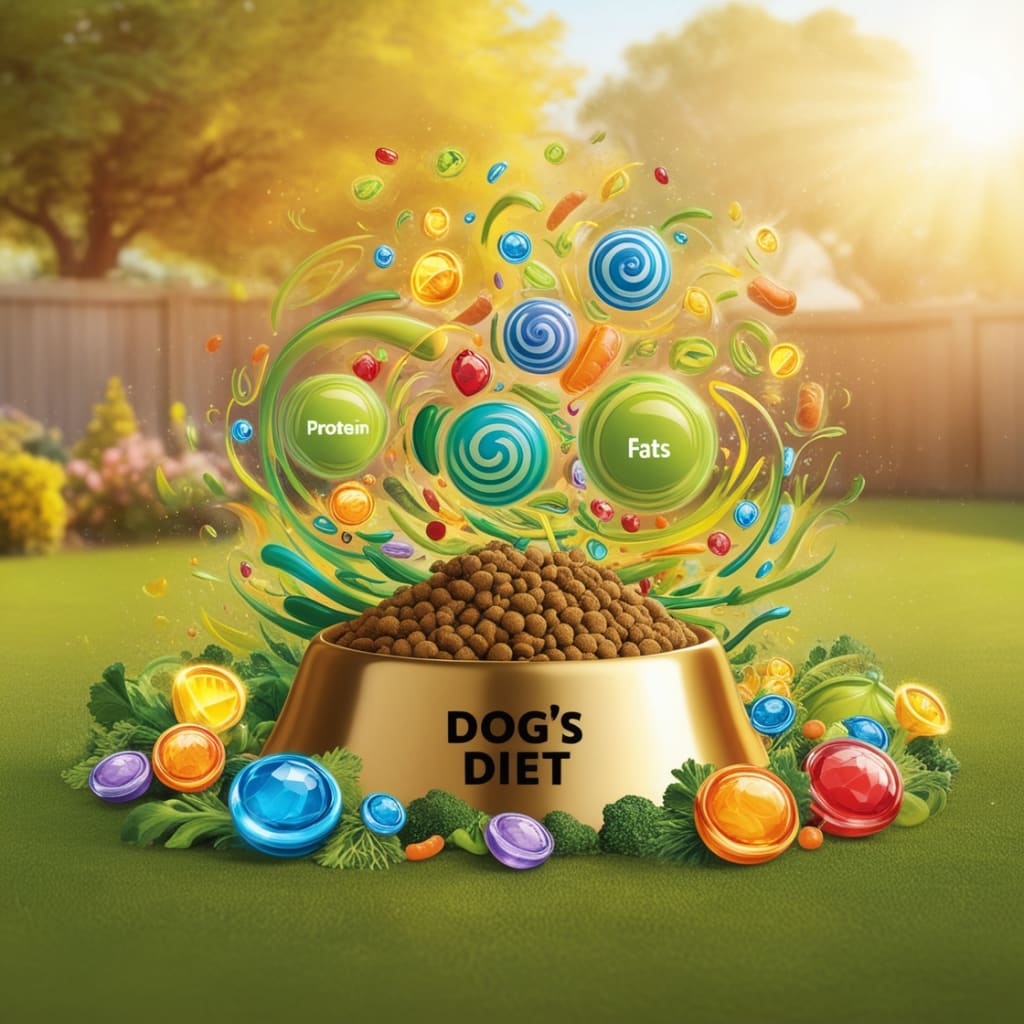
More details and images: Balanced Diet for Dogs: Expert Guidance on Nutrition
As a responsible dog owner, ensuring your furry friend receives a balanced diet is crucial for their overall health and well-being. In this article, we'll dive into the essential nutrients your dog needs and provide expert tips on creating a well-rounded meal plan. By understanding the key components of a balanced diet, you can help your dog thrive and live a happy, healthy life.
Essential Nutrients for Dogs
A balanced diet for dogs should include the following essential nutrients:
Protein
Protein is the building block of life and is essential for maintaining healthy muscles, organs, and tissues. It also plays a crucial role in hormone production, enzyme function, and immune system support. High-quality protein sources for dogs include:
Lean meats (e.g., chicken, beef, turkey)
Fish (e.g., salmon, cod)
Eggs
Plant-based proteins (e.g., legumes, soy)
Fats
Fats provide a concentrated source of energy for dogs and aid in the absorption of fat-soluble vitamins (A, D, E, and K). They also contribute to a healthy skin and coat, support brain development, and help regulate inflammation. Essential fatty acids for dogs include:
Omega-3 fatty acids (e.g., EPA, DHA)
Omega-6 fatty acids (e.g., linoleic acid)
Carbohydrates
Carbohydrates provide energy for daily activities and support digestive health. They also help maintain blood sugar levels and provide fiber for proper bowel function. Suitable carbohydrate sources for dogs include:
Whole grains (e.g., brown rice, oats, barley)
Starchy vegetables (e.g., sweet potatoes, peas, carrots)
Fruits (e.g., apples, berries, bananas)
Vitamins
Vitamins are organic compounds that support various bodily functions, including metabolism, immune system health, and vision. Essential vitamins for dogs include:
- Vitamin A: Supports eye health, skin and coat, and immune function
- B-vitamins: Aid in energy metabolism, nervous system function, and red blood cell production
- Vitamin C: Acts as an antioxidant and supports immune health
- Vitamin D: Regulates calcium and phosphorus levels for strong bones and teeth
- Vitamin E: Serves as an antioxidant and supports skin and coat health
- Vitamin K: Essential for proper blood clotting
Minerals
Minerals are inorganic compounds that play vital roles in various physiological processes, including bone and tooth formation, fluid balance, and enzyme function. Essential minerals for dogs include:
- Calcium: Supports strong bones and teeth
- Phosphorus: Works with calcium for bone and tooth health
- Potassium: Regulates fluid balance and supports muscle and nerve function
- Sodium: Maintains fluid balance and supports nerve impulse transmission
- Magnesium: Aids in energy metabolism and muscle and nerve function
- Iron: Essential for red blood cell production and oxygen transport
- Zinc: Supports immune function, skin and coat health, and wound healing
- Copper: Aids in collagen formation and pigmentation
- Manganese: Supports bone development and metabolic function
- Selenium: Acts as an antioxidant and supports thyroid function
By ensuring your dog's diet includes these essential nutrients in the appropriate proportions, you can help support their overall health and well-being. Always consult with your veterinarian to determine the best diet plan for your individual dog's needs.
Recommended Macronutrient Ratios
When planning your dog's meals, it's essential to provide the right balance of macronutrients – protein, fats, and carbohydrates – to ensure they receive the nutrients necessary for optimal health. The following macronutrient ratios are recommended for adult dogs:
Protein
Adult dogs require a minimum of 18% protein in their diet, but a range of 25-30% of total calories from protein is considered optimal. Protein is vital for maintaining lean muscle mass, supporting immune function, and promoting healthy skin and coat. When selecting protein sources, prioritize high-quality, animal-based proteins such as:
Lean meats (e.g., chicken, beef, turkey)
Fish (e.g., salmon, cod)
Eggs
Dairy products (e.g., cottage cheese, plain yogurt) Plant-based proteins, such as legumes and soy, can also contribute to your dog's protein intake but should not be the sole source of protein in their diet.
Fats
Fats should make up approximately 15-20% of your dog's total caloric intake. Fats provide a concentrated source of energy, support brain development, and help maintain a healthy skin and coat. When choosing fat sources, focus on quality fats rich in essential fatty acids, such as:
Omega-3 fatty acids: Found in fish oil, flaxseed oil, and algal oil
Omega-6 fatty acids: Found in poultry fat, vegetable oils (e.g., sunflower oil, safflower oil) Avoid excessive amounts of saturated and trans fats, which can contribute to obesity and other health issues.
Carbohydrates
Carbohydrates should comprise 50-60% of your dog's total caloric intake. While dogs do not have a specific requirement for carbohydrates, they provide a readily available energy source and can be a part of a balanced diet. Choose complex, whole-grain carbohydrates that are easily digestible and provide dietary fiber, such as:
Brown rice
Oats
Barley
Sweet potatoes
Peas
Carrots Avoid simple, refined carbohydrates like white rice, white bread, and sugary treats, as they can cause rapid spikes in blood sugar and contribute to obesity and dental issues.
Tips for Achieving the Right Macronutrient Balance
Choose commercial dog foods that meet the recommended macronutrient ratios and are appropriate for your dog's life stage and activity level
If preparing homemade meals, work with a veterinary nutritionist to ensure the diet is complete and balanced
Monitor your dog's weight and body condition regularly, adjusting their diet as needed to maintain a healthy weight
Consult with your veterinarian if your dog has specific health concerns that may require a specialized diet
Choosing Quality Dog Food
When selecting dog food, it's crucial to choose a high-quality product that meets your dog's nutritional needs. With so many options available, it can be overwhelming to determine which food is best for your furry friend. Consider the following factors when making your decision:
Quality Protein Sources
Look for dog foods that list high-quality protein sources as the first few ingredients. These may include:
Whole meats (e.g., chicken, beef, lamb, turkey)
Meat meals (e.g., chicken meal, beef meal)
Fish (e.g., salmon, whitefish) Avoid products that contain unnamed meat sources (e.g., "meat by-products") or plant-based proteins as the primary protein source.
Whole Grains and Digestible Carbohydrates
Choose dog foods that contain whole grains or easily digestible carbohydrates, such as:
Brown rice
Oats
Barley
Sweet potatoes
Peas These ingredients provide essential nutrients, fiber, and energy for your dog. Avoid products that contain excessive amounts of fillers or low-quality carbohydrates like corn, wheat, and soy.
Essential Fatty Acids
Quality dog foods should include a balanced mixture of essential fatty acids, such as:
Omega-3 fatty acids (e.g., EPA, DHA): Support brain development, heart health, and anti-inflammatory properties
Omega-6 fatty acids (e.g., linoleic acid): Promote healthy skin and coat Look for ingredients like fish oil, flaxseed oil, or chicken fat, which are rich sources of these beneficial fats.
Vitamins and Minerals
A balanced dog food should contain a comprehensive blend of vitamins and minerals to support various bodily functions. Key vitamins and minerals to look for include:
Vitamin A, D, E, and K
B-vitamins (e.g., thiamine, riboflavin, niacin, pantothenic acid, pyridoxine, biotin, folic acid, vitamin B12)
Calcium and phosphorus
Potassium
Zinc
Iron
Copper These nutrients should be present in appropriate amounts based on your dog's life stage and health status.
Avoid Artificial Additives
Steer clear of dog foods that contain artificial preservatives, colors, or flavors. These additives offer no nutritional value and may even be harmful to your dog's health. Common artificial additives to avoid include:
BHA (Butylated Hydroxyanisole)
BHT (Butylated Hydroxytoluene)
Ethoxyquin
Propylene glycol
Artificial colors (e.g., Blue 2, Yellow 5, Red 40) Instead, opt for products that use natural preservatives like vitamin E (mixed tocopherols), vitamin C (ascorbic acid), and rosemary extract.
Choose Age and Health-Appropriate Formulas
Select dog foods that are tailored to your pet's life stage and health needs. For example:
Puppy formulas: Higher in calories, protein, and essential nutrients to support growth and development
Adult formulas: Balanced nutrition for maintenance and overall health
Senior formulas: Lower in calories, higher in fiber, and added joint-supporting nutrients
Breed-specific formulas: Tailored to the unique nutritional needs of different dog breeds
Therapeutic diets: Prescribed by veterinarians to manage specific health conditions (e.g., weight management, dental health, digestive issues)
By choosing a high-quality dog food that meets these criteria, you can help ensure your furry companion receives the balanced nutrition they need to thrive. Always consult with your veterinarian for personalized recommendations based on your dog's individual needs and health status.
Homemade Dog Food and Treats
While commercial dog foods offer convenience and balanced nutrition, some pet owners prefer to prepare homemade meals and treats for their furry friends. When done correctly, homemade dog food can provide a nutritious and customizable alternative to store-bought options. However, it's crucial to ensure that the homemade diet is complete and balanced to meet your dog's specific nutritional needs.
Consult with a Veterinary Nutritionist
Before starting a homemade diet, consult with a veterinary nutritionist who can help you create a well-balanced meal plan tailored to your dog's age, size, breed, and health status. They can provide guidance on:
Appropriate nutrient ratios
Portion sizes
Supplementation (if necessary)
Specific dietary requirements based on health conditions
Use Trusted Recipes
When preparing homemade dog food, use recipes from reputable sources that have been developed or reviewed by veterinary nutritionists. These recipes should include a variety of high-quality ingredients to ensure your dog receives all the necessary nutrients. Some key components of a balanced homemade diet include:
Lean proteins (e.g., chicken, beef, turkey, fish)
Complex carbohydrates (e.g., brown rice, sweet potatoes, oats)
Vegetables (e.g., carrots, green beans, spinach)
Healthy fats (e.g., fish oil, coconut oil)
Vitamin and mineral supplements (as recommended by a veterinary nutritionist)
Practice Safe Food Handling
When preparing homemade dog food, follow safe food handling practices to minimize the risk of foodborne illnesses:
Wash your hands thoroughly before and after handling raw ingredients
Use separate cutting boards and utensils for raw meats and other ingredients
Cook meats to their appropriate internal temperatures
Store homemade dog food in the refrigerator or freezer and discard any leftovers after 3-4 days
Healthy Homemade Dog Treats
In addition to homemade meals, you can also prepare healthy treats for your dog. Keep treats to a minimum and choose nutrient-rich options such as:
Sliced fruits (e.g., apples, bananas, blueberries)
Cooked vegetables (e.g., carrots, green beans, sweet potatoes)
Small pieces of cooked lean meats (e.g., chicken, turkey)
Homemade puzzle toys stuffed with low-fat plain yogurt or pureed pumpkin Remember, treats should make up no more than 10% of your dog's daily caloric intake to avoid unbalancing their diet.
Monitor Your Dog's Health
When transitioning to a homemade diet or introducing new treats, closely monitor your dog's health and well-being. Watch for any signs of digestive upset, such as vomiting or diarrhea, and adjust the diet accordingly. Regular check-ups with your veterinarian can help ensure your dog is maintaining a healthy weight and receiving appropriate nutrition.
While homemade dog food and treats can offer a personalized and nutritious option for your pet, it's essential to approach the process with care and guidance from a veterinary professional. By working closely with a veterinary nutritionist, using trusted recipes, and practicing safe food handling, you can provide your dog with a wholesome and balanced homemade diet that supports their overall health and happiness.
Providing your dog with a balanced diet is essential for their overall health, happiness, and longevity. By understanding the key nutrients, recommended ratios, and selecting quality food options, you can ensure your furry companion receives the nourishment they need to thrive. Always consult with your veterinarian for personalized advice tailored to your dog's specific needs. With a well-balanced diet, your dog will be on the path to a long, healthy life filled with endless tail wags and joyful barks.
More details and images: Balanced Diet for Dogs: Expert Guidance on Nutrition
About the Creator
Enjoyed the story? Support the Creator.
Subscribe for free to receive all their stories in your feed. You could also pledge your support or give them a one-off tip, letting them know you appreciate their work.





Comments
There are no comments for this story
Be the first to respond and start the conversation.